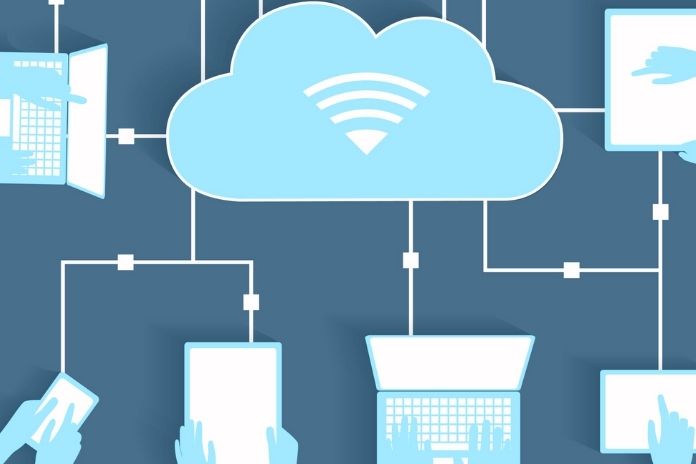Mobile cloud: Suppose a decade ago, the low speed of mobile networks limited the use of cloud computing to develop mobile applications; today, with the growth of connection capacities.
In that case, we live in a moment of elevation and versatility of mobile cloud computing. This technology has attracted the attention of entrepreneurs as a profitable business option, reducing costs and making mobile application development more versatile. In this post, we will better understand this technology’s bases and advantages. Check out!
What Is Mobile Cloud Computing?
In its most basic form, mobile cloud computing refers to an infrastructure where data storage and processing occur outside the mobile device. Applications take computing power and information storage from devices to the cloud.
Mobile cloud computing (MCC) brings a new paradigm to mobile applications, where data processing and storage are moved to powerful, centralized computing platforms. They, in turn, are accessed wireless, based on a native app or web browser.
What Is The Structure Of Mobile Cloud Computing?
Generally, the cloud is a large-scale distributed networking system implemented based on multiple servers in data centers. Its services are classified based on the concept of layers.
Data Center
This layer provides the hardware resource and infrastructure for running the cloud. Here, several servers are connected to high-speed networks to deliver client services. Typically, data centers are built in less populated locations, with high power supply stability and low risk of natural phenomena such as earthquakes and hurricanes.
IaaS
IaaS is built on top of the data center layer and enables the provisioning of storage, hardware, servers, and networking components . The customer pays only for what he uses, generating enormous savings and budgetary control since its infrastructure can be dynamically expanded or reduced as necessary, favoring scalability. Some examples are Amazon Elastic Cloud Computing and Simple Storage Service.
PaaS
Platform as a Service provides a powerful, integrated environment for building, testing, and deploying custom applications. The best-known are Google App Engine, Microsoft Azure, and Amazon Map Reduce/Simple Storage Service.
SaaS
Software as a Service supports a system deployment with specific requirements. At this tier, users can access an application and information remotely over the internet and only pay for what they use.
Although the architecture of cloud computing can be divided into four layers, it does not mean that they must necessarily be placed in sequence. For example, SaaS applications can be directly deployed on IaaS instead of PaaS.
Also, some services can be considered part of more than one layer. This is the case of the data storage service, viewed by many as IaaS or PaaS. Thus, users can use the services flexibly and efficiently.
What Are The Main Benefits Of Mobile Cloud Computing?
Now that you know what a mobile cloud is and the layers that make this model exist, let’s better understand the benefits that this solution delivers. Follow along.
More Reliability
Storing data or running applications in the cloud is an effective way to improve reliability as the data and the application are stored in redundancy, i.e., on multiple computers in different locations. This reduces the chance of losing information on mobile devices.
Furthermore, the MCC can be designed as a comprehensive data security model for service providers and users. The cloud can protect copyrighted digital content, such as music and videos, from misuse and unauthorized distribution. In addition, the mobile cloud computing provider will be able to provide users with security services such as virus scanning, bypass detection, and authentication.
Dynamic Provisioning
On-demand dynamic provisioning of resources on a fine-grained, self-service basis is a flexible way for service providers and mobile users to run their applications without advanced resource booking.
Scalability
Due to flexible resource provisioning, mobile application deployment can run and scale to meet business seasonality. Service providers can easily add and expand an application or service without bureaucracy, enabling scalability.
Economy
In public clouds, service providers share resources among all users of that structure. Thus, costs are diluted, and even small and medium-sized companies can develop mobile solutions.
Is Mobile Computing The Same As Mobile Cloud Computing?
As much as they seem synonymous, they are not the same thing. In the traditional model, applications run on a mobile device in native mode; all the data necessary for the app to work are stored on the device.
As for applications developed and executed in the cloud, they run in the data centers that make up the cloud, and requests are made via the web, through a mobile network, 3G, 4G, 5G, etc., or Wi-Fi. The touch point is the underlying browser or app. The advantage of MCC is that users can run more robust applications, as all requests will be made on the server.
In this post, we answer some questions about mobile cloud computing and understand that migration is an inevitable path with no return, not just for applications. Currently, IaaS and PaaS allow a company’s entire infrastructure to be virtualized, reducing business expenses with resources and equipment, in addition to more control of what is consumed.

